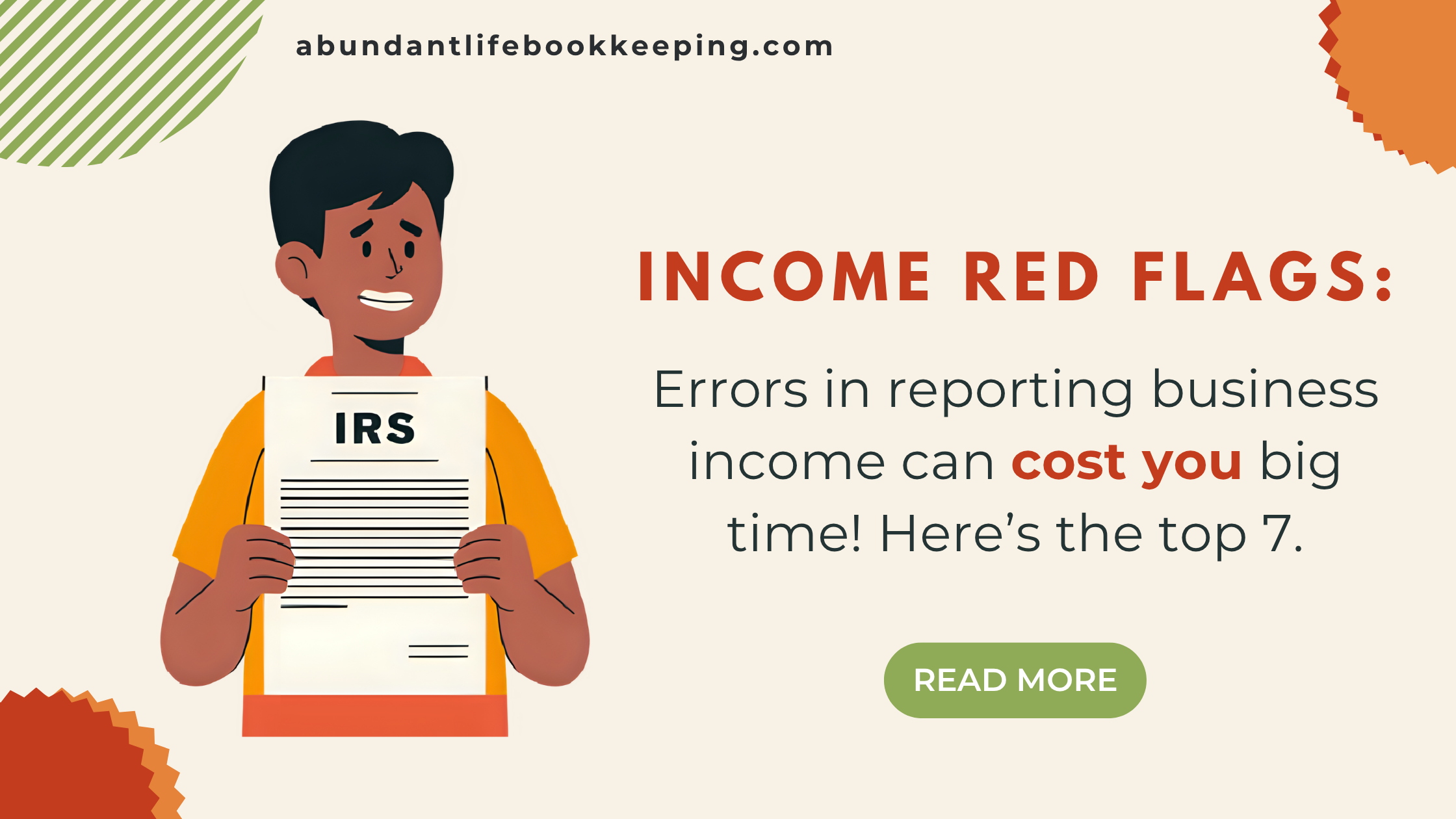
 Meet Samantha:
Meet Samantha:
Samantha thought she had it all figured out.
Her massage therapy business was finally picking up steam, appointments were coming in, her new website was live, and she even started offering gift cards (hello, holiday shoppers! 🎁). She felt like a boss.
That is, until the letter came…from the IRS.
Dear Samantha, it read. We’ve noticed some discrepancies in your reported business income. Please respond within 30 days.
Samantha’s stomach dropped; she didn’t mean to mess anything up.
“I didn’t do anything wrong!” she panicked. “I kept track of everything…well, mostly everything…I think??”
The IRS Isn’t Just Guessing:
They have systems. They get reports. And they’re always comparing what you say you made (your business income) to what others say you made.
We’ve worked with lots of small, service-based business owners who are just trying to make an honest living. They didn’t mean to mess up. But sometimes, when it comes to tracking business income, the IRS doesn’t know the difference between an honest mistake and an attempted sneaky tax dodge.
So let’s talk about some common business income red flags that can trigger IRS attention—and more importantly, how to avoid them like a pro (without needing a therapy session afterward 😅).
 Red Flag #1: Forgetting App-Based Income
Red Flag #1: Forgetting App-Based Income
Let’s go back to Samantha for a sec. In addition to her massage therapy sessions, she also sold a few essential oils and self-care kits on the side. Her clients paid through Stripe and PayPal, which made the process feel effortless and casual. However, Samantha had forgotten something: those platforms now report business income to the IRS.
So, when she thought she was being honest in reporting $40,000 in Stripe income, but Stripe sent information to the IRS reporting that she brought in $55,000, that’s not going down well.
If you’re only counting what hits your primary bank account, you might miss income from:
- PayPal
- Venmo
- Stripe
- Square
- Zelle
If you forget to report that money, you might be underreporting your business income, and if the IRS sees that those platforms reported more income than you did…cue the possible dreaded letter.
What to do instead:
- Track app income every month
- Include it in your bookkeeping
- Use a professional who understands how these platforms work (it can be more complicated than you think to account for app income)
 Red Flag #2: Your Bank Says One Thing, Your Books Say Another
Red Flag #2: Your Bank Says One Thing, Your Books Say Another
Let’s say you told the IRS you made $85,000 in your dog grooming business last year. But your business bank account shows $112,000 in deposits.
Now you’ve got two problems:
- The IRS thinks you’re underreporting business income
- You’re not sure where that extra $27k came from because your books are a mess 😬
This can happen if:
- You’re combining personal and business funds in one account
- You got a loan or a personal gift and deposited it into the business
- You didn’t track refunds or returns correctly
- You’re manually entering numbers (and your cat stepped on your keyboard again)
Fix it like a pro:
👉 Match your sales records to your deposits monthly (at a minimum).
👉 Label every deposit clearly.
👉 And keep personal funds out of your business account (and vice versa).
 Red Flag #3: You Deducted More Than You Earned
Red Flag #3: You Deducted More Than You Earned
“Wait… you wrote off $24,000 in travel expenses, but you only made $16,000 in income?” That’s the kind of eyebrow-raise you don’t want from the IRS.
Now, sure—maybe you went to three trade shows and they really did cost that much. But without good records and reasonable explanations, it looks fishy if your business income doesn’t come close to covering your expenses.
How this happens:
- You’re trying to maximize your deductions (understandable)
- You had a tough year, and revenue was low
- You guessed instead of tracking actual numbers
A better path:
👉 Keep receipts for EVERYTHING (and no, bank statements won’t cut it)
👉 Make sure your deductions match your business activity. If your business income was small, your deductions should probably be too, or at least well-documented.
👉 Work with a trusted CPA.
 Red Flag #4: Your Income Bounces Around Like a Ping-Pong Ball
Red Flag #4: Your Income Bounces Around Like a Ping-Pong Ball
One year, you report $120,000. The following year, it’s $40,000. Then it jumps to $95,000. Even if it’s legit, sudden jumps and drops in business income without an explanation can attract attention; even if the changes are real, the IRS may want to know why.
Good records help you explain the “why.”
Help yourself out:
👉 Make sure you’re tracking EVERY expense and EVERY piece of income in your bookkeeping software. This allows you to easily provide a trail (along with receipts) of how you arrived at your net income.
👉 Use bookkeeping software that can sync with your bank and credit card accounts. This will automatically pull in all transactions and keep you from manually entering them, which reduces your chances of mistakes.
 Red Flag #5: Mixing Personal and Business Income
Red Flag #5: Mixing Personal and Business Income
You’re at the grocery store and your business debit card is handy. Swipe. Later, you deposit a $500 birthday check from Grandma into your business account. No big deal, right? I mean, you do this all the time – it’s your money, so who cares?
Wrong 🙃
Blending business and personal money is a quick way to confuse your records and make it hard to figure out what’s real business income. And who wants to report more income than they actually made, because that means paying more in taxes!
Fix it with these simple rules:
- Use separate accounts (ALWAYS)
- If you must transfer between them, label those transfers correctly in your bookkeeping software as Owner Draw/Owner Contribution
- Use separate accounts (ALWAYS – and again we say ALWAYS)
 Red Flag #6: Your Tax Return and Your Books Don’t Match
Red Flag #6: Your Tax Return and Your Books Don’t Match
Here’s what we often see: the business owner gives their tax preparer a QuickBooks file or a spreadsheet, a shoebox of receipts, and a prayer.
The numbers on their return end up different from what’s in their books. Now the IRS is scratching its head.
Keep it clean with these steps:
👉 Make sure your bookkeeping is up-to-date before tax time
👉 Review your reports with your bookkeeper and CPA
👉 Double-check what ends up on the tax return
If something changes, such as the accountant adding depreciation or adjusting your mileage, make a note of it in your records and update your books so that everything aligns.
 Red Flag #7: You’re a Cash-Heavy Business, But There’s No Trail
Red Flag #7: You’re a Cash-Heavy Business, But There’s No Trail
Cash-based businesses (such as hair, massage, food, cleaning, etc.) are often scrutinized more closely. Why? Because it’s easy to overlook $20 here and $50 there.
If your business income seems suspiciously low for a cash business, you could get flagged because the IRS knows these types of businesses sometimes forget to report all their business income.
Here’s what helps:
👉 Use a logbook or software to track every payment—yes, even that $40 cash tip.
👉 Deposit the cash into the business account, don’t just spend it.
👉 Don’t assume “it’s not traceable” means “you don’t have to report it.” It is, and you do!
 The Good News: All of This is Fixable!
The Good News: All of This is Fixable!
Most business owners aren’t trying to hide anything—they just need a little help keeping things clear.
Here are the two biggest things that can keep you and your business out of hot water:
- Solid bookkeeping
- Someone to help you make sense of it all
There are other great side effects of clean books other than just staying out of trouble:
- Sleep better at night, not worrying about whether your numbers are correct or not
- File your taxes without stress
- Prove your income if you ever need a loan or want to sell
Real Talk: Let’s Get Your Books In Order
Samantha’s story had a happy ending. She ended up calling a bookkeeper (smart move 💪). They identified the issues in her reported business income, updated her reports, and provided her with the necessary information to respond to the IRS. No penalty. No audit. Just relief.
Now, she sends in her numbers with confidence every year and has more time to do what she loves—take care of clients and maybe sneak in a nap on Tuesdays 😉
Your turn.
Need a second set of eyes? Got a mess on your hands? Curious if your numbers add up right?
👉 Click below to book a free, no-pressure chat with our team. We love bookkeeping, coffee, and helping service-based business owners like you feel confident in your numbers.
Let’s make your next tax season feel like a breeze.
Ready for a helping hand? Nab your FREE, 30-minute strategy session today!

Amanda Wylie – Certified QuickBooks Online ProAdvisor
Owner/CEO
I love the Lord and live way out in the country with my wonderful husband and my 8 children still at home. Besides everything bookkeeping, my passions and interests include gardening, chickens, herbal remedies, coffee and learning new things!
Follow me on:
Related Posts
How To Find The Right Bookkeeper For Your Business!
The harsh truth. Owning a small business can feel like juggling flaming swords – thrilling but terrifying! Face it—one of the less thrilling swords is keeping up with your finances. Most of you, except for the few odd ducks out there, didn’t start your business...
How to Make Dreaded 1099 Prep Easier!
1099 Prep: I know! How dare I mention the phrase ‘1099s’ 😡 But wait! Before you report me for cruel and unusual punishment, what if I told you there was at least one way to make next year’s 1099 prep a little easier? That’s right, put the hammer down - no need...
Ignoring Receipts? Why It Could Cost You Big Time!
Receipts… Love 'em or hate 'em, they’re a big deal when running a successful business. But let’s be real—keeping track of those little slips of paper can feel like trying to catch confetti in a windstorm. Sound familiar? OR, maybe you’ve experienced this...



